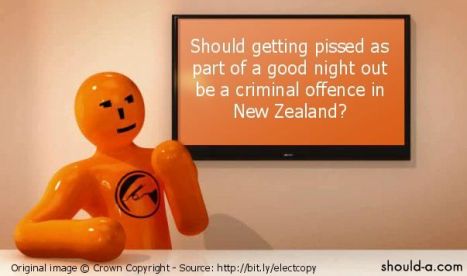
Geoffrey Palmer want to make being drunk in public an offence in New Zealand:
“It’s not an offence to be drunk in a public place but nonetheless police have to deal with (drunk people), but they have nowhere to take them.”
Being drunk in a public place should be an infringement offence that incurs a fine, Sir Geoffrey said.
The law could include drunk and disorderly behaviour or only being drunk and discretion be left to police on whether to charge someone or not. (…)
The amount of police resources used policing the “late night culture” in New Zealand was “truly astonishing”, he said.
“Unless you saw it you wouldn’t believe it.”
This guy is clearly a puritan; he doesn’t like drinking and feels the need to Do Something about it. He’s willing to cite whatever shonky research best serves his case.
Still, at first glance, banning public drunkenness seems like a better option than increasing the excise tax on alcohol or taking other measures to “reduce availability.” If government wants to reduce the external costs of alcohol, it should address behaviour most closely related to external harm. People who are drunk in public are far more likely than those having a couple of beers at home to cause problems for others. As Ed Stringham puts it, “raising taxes on alcohol to prevent problem drinking is akin to raising the price of gasoline to prevent people from speeding.”
As it happens, I don’t think government should be concerned with reducing the social costs of alcohol: I think they are much smaller than the social costs of any policy intervention I can imagine. Even if we accept the need to Do Something, however, Palmer’s proposal worries me more than other (perhaps less efficient) means of alcohol control.
Since being drunk is arbitrary, the proposal would give police more arbitrary power. As someone who takes the rule of law seriously, this worries me more than the (very high) cost of excise taxes on innocent drinkers. Unless you think being drunk is itself wrong, in which case I don’t much value your opinion, this gives cops another legal weapon to brandish against innocent people they don’t quite like the look of.
Discretionary power sounds reasonable enough, but it is dangerous. It replaces the rule of law with the rule of men, and history teaches us that power corrupts.
Filed under: libertarian, paternalism, political science, politics | Tagged: alcohol, arbitrary power, healthism, moral panic, nz politics, rule of law, symbolic politics | 3 Comments »






